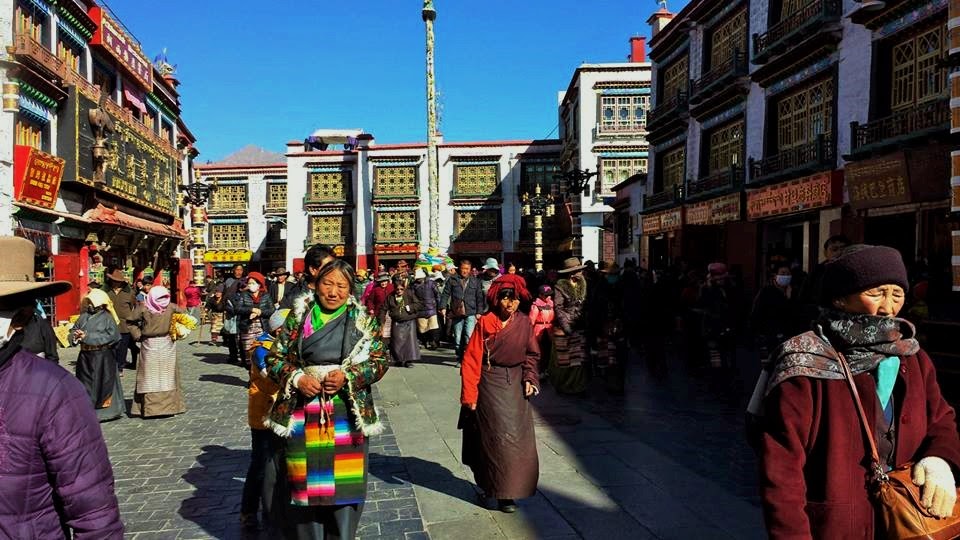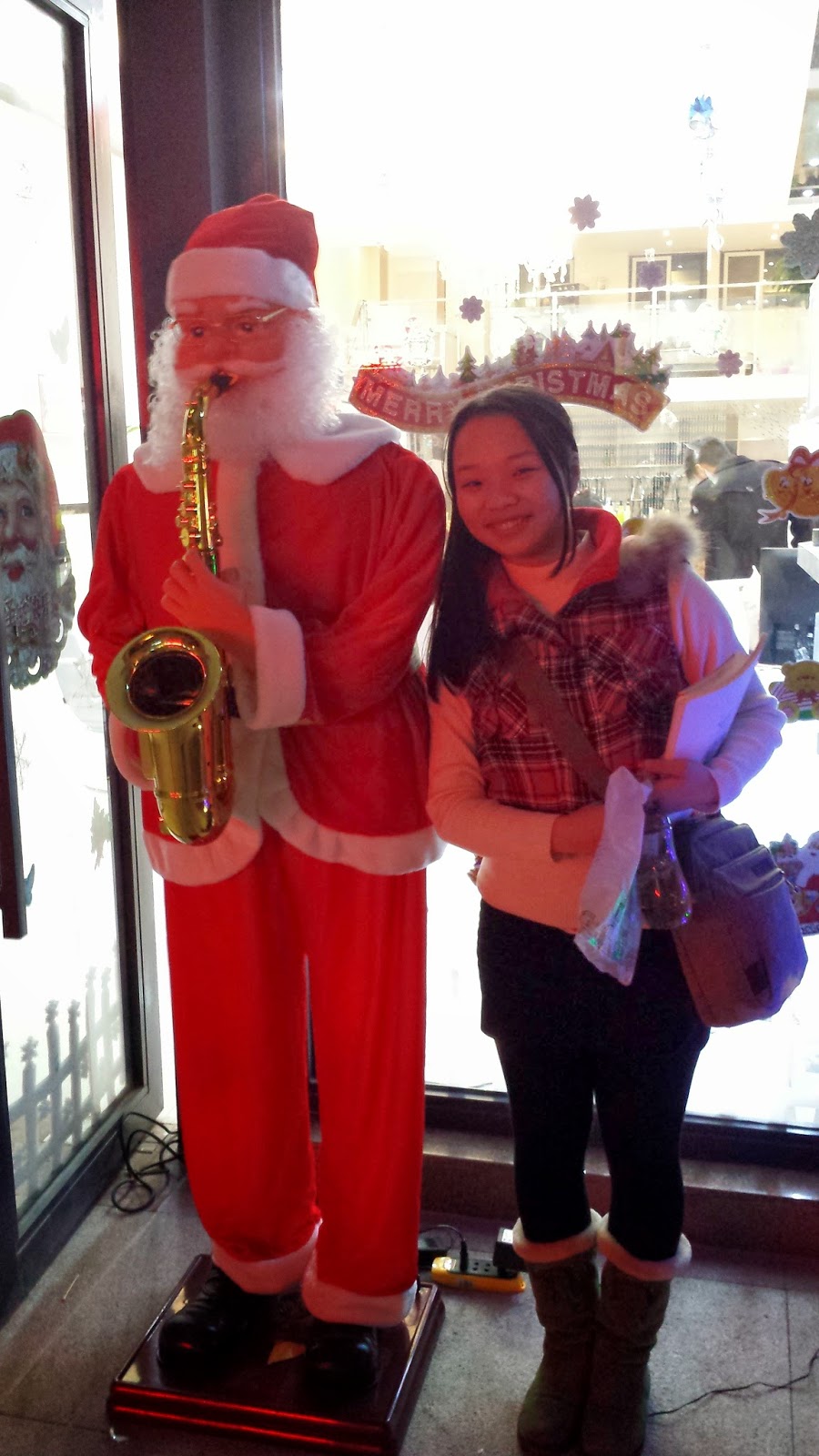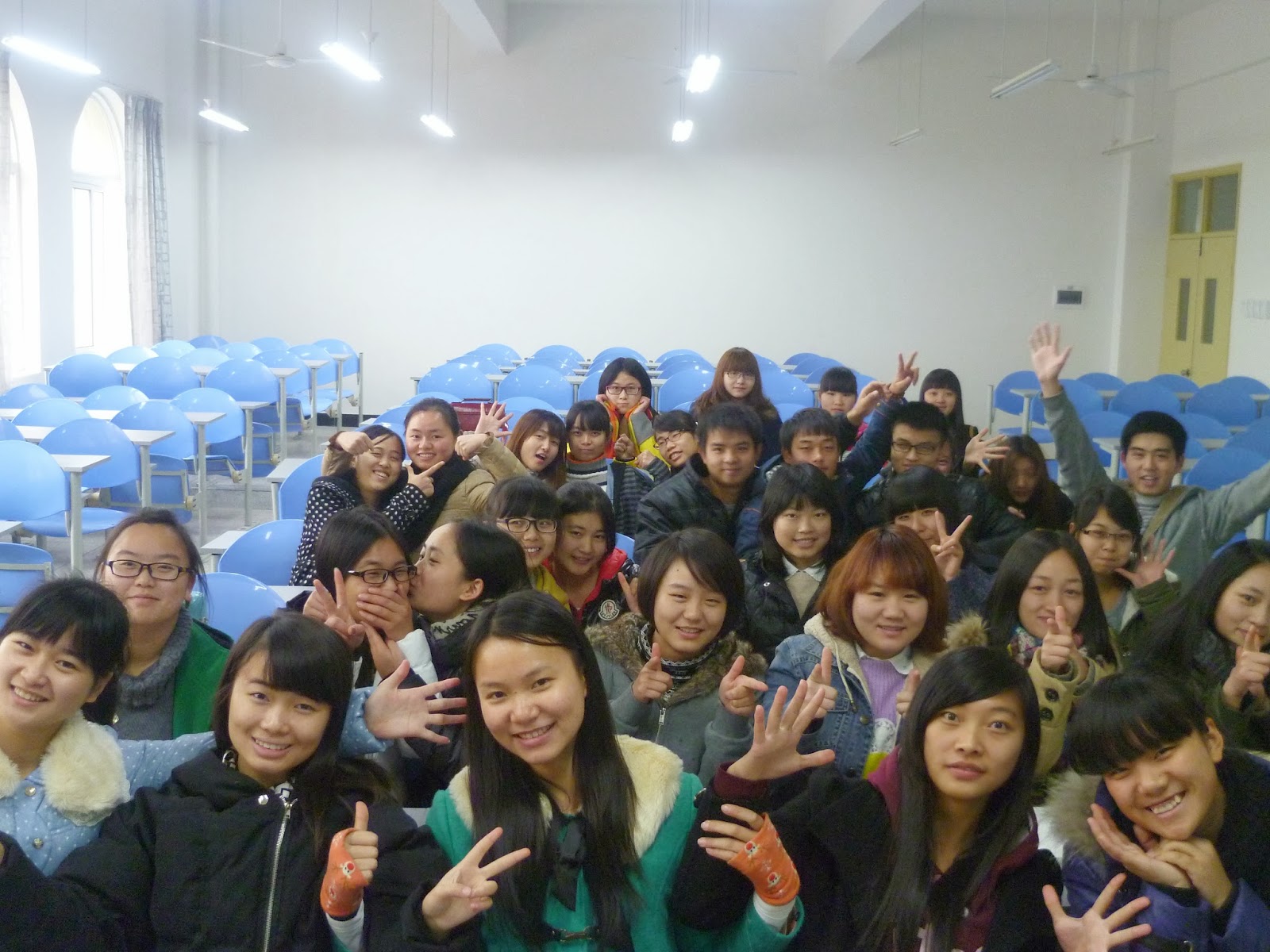Location: Autonomous region of Western China
Population: 3.03 million
Famed For: Called the ‘Roof of the World’ it is home to the world’s highest peak, Mt. Everest and is synonymous with Buddhism, yaks and altitude sickness.
'Teacher! Why
do you go Tibet in January? It is so cold and high up. No! Do not be so happy! If you get excited you could die.'
- Student Quote of the Week
 A riot of colour after the smog grey tones of Chengdu, every shade here is sharper; crisply unambiguous against the shocking blue of the sky. The houses line the roads in glistening white, brick blocks. Primary coloured prayer flags snap back and forth in the wind.The pilgrims circle Jokhang Temple in rainbow coils, the women's long black skirts overlaid with multi-coloured, striped, woollen aprons trailing in the dust as they walk by. Monks in saffron robes vanish amongst the labyrinthine crimson and carnelian temple rooms. Every surface is painted in scarlet, gold and mustard yellow, cream and black, no space untouched by colour. Only the mountains are brown and bare of everything except for a covering of snow on the peaks. We are too early for the riot of wildflowers that carpet them every spring.
A riot of colour after the smog grey tones of Chengdu, every shade here is sharper; crisply unambiguous against the shocking blue of the sky. The houses line the roads in glistening white, brick blocks. Primary coloured prayer flags snap back and forth in the wind.The pilgrims circle Jokhang Temple in rainbow coils, the women's long black skirts overlaid with multi-coloured, striped, woollen aprons trailing in the dust as they walk by. Monks in saffron robes vanish amongst the labyrinthine crimson and carnelian temple rooms. Every surface is painted in scarlet, gold and mustard yellow, cream and black, no space untouched by colour. Only the mountains are brown and bare of everything except for a covering of snow on the peaks. We are too early for the riot of wildflowers that carpet them every spring.The air is choked with smoke and incense, even in the open places of the market squares. Inside the temples the effect is concentrated; Potala Palace, the ancient home of the Dalai Lama, cloisters and ferments within its warren of windowless rooms hundreds of years of perfume, smoke, incense and prayers.

It's noisy. The rasp of wood or paper against the street floor as someone prostrates themselves.The litany of prayer in a temple courtyard. The gabbling chants of beggar children tugging at elbows for money. The clap of hands as the novices argue religious philosophy in the debating grounds. An army truck backfiring in the street. A herd of goats crossing a mountain road. The latest Tibetan pop hit blasting from someone's car radio.
There is yak in everything. We drink yak butter tea, eat yak curry, yak with potatoes, yak soup, yak pie. Even the bread has yak in it- flat, oily baked circles with morsels of meat pressed into the dough. It's surprisingly good, though after a while the combination of altitude sickness and yak flavouring does not mix and leaves the group queasily staring at our free breakfast of yak noodles, wishing for plain toast or fruit.
X and E are hardest hit with a bout of sickness that comes and goes and then returns viciously on random days. L battles a stinking headache with copious amounts of Tiger Balm and I swallow my Chinese herbal tablets and am only sick the first day. We all struggle to sleep at night and toilet paper becomes as valuable as gold. G is the lucky one who is least affected by it all, but then, as the tallest in our group we joke that she's been used to a higher altitude than the rest of us for most of her life.
 You can tell somewhere is worth visiting though when despite being ill you still find it absolutely breath-taking. And it is. Standing on the flat roof of a temple or the steps of the palace gazing out over Lhasa we really do feel like we're in another world. These are people who feel their religion intensely. Who live amongst spirits and demons and placate them with offerings. Who practice sky burials, giving their loved ones to the birds. Who are born and reborn and born again.
You can tell somewhere is worth visiting though when despite being ill you still find it absolutely breath-taking. And it is. Standing on the flat roof of a temple or the steps of the palace gazing out over Lhasa we really do feel like we're in another world. These are people who feel their religion intensely. Who live amongst spirits and demons and placate them with offerings. Who practice sky burials, giving their loved ones to the birds. Who are born and reborn and born again.
Here there is no Starbucks, no H&M, no creeping westernisation. No roadside services except for a bench over a communal hole erected inside a shed. No hand soap. No shiny commercialism. No tourists. No WiFi café's or hundreds of TV channels. It's a refreshing change after China and the brief respite from the sound of spitting is welcome too.
But China is still stamped all over Tibet, an unwelcome mark that mars its beauty. Chinese flags fly from the buildings. Chinese police watch the crowds from the rooftops under shaded awnings. The roads are littered with checkpoints where journeys are recorded and time stamped- go too fast or too slowly and you're fined at the next checkpoint. Tibetan jobs are filled by resettled Han Chinese. Pictures of the Dalai Lama hang in restaurants and temples, but the man himself is an exile. As for the real Panchen Lama, no-one knows where he is. And most tellingly, no-one will talk about it. Our guide, a lovely man who hopes his third son will become a monk, will only talk about the Friendship Highway, which the Chinese built, cutting a swathe through the sweeping mountains in shiny black tarmac. It isn't safe for him to talk about anything more than that.
We talk about other things instead.
The beauty of Lake Yamdrok. The queues of pilgrims we see waiting to enter Sera Monastery. How the sound of the curved horn blown by a monk on the roof of Tashi Lumpo Monastery sounds like no noise we have ever heard before. Why the sweets we picked up in Lhasa are the taste equivalent of a confectionary Russian roulette. Why everyone thinks it's arctic in January in Tibet when you can walk around without a coat if you want. Why walking up a flight of stairs at altitude leaves you feeling like you've climbed Chomolungma. How I had my photograph taken at Potala and didn't notice the little girl doing a poo in the background.
And then it's over.
 Our few days in Tibet end and we have to say goodbye. I go back to Chengdu before flying to Beijing to meet my parents and Grandad, whilst the others go in different directions to varying different countries. I hate goodbyes and saying goodbye to G is odd after over five months of living and working together. She's off touring the world and won't be home until summer but there's talk of a group reunion and with email and Facebook, these days you're never too far away from your friends, new or old.
Our few days in Tibet end and we have to say goodbye. I go back to Chengdu before flying to Beijing to meet my parents and Grandad, whilst the others go in different directions to varying different countries. I hate goodbyes and saying goodbye to G is odd after over five months of living and working together. She's off touring the world and won't be home until summer but there's talk of a group reunion and with email and Facebook, these days you're never too far away from your friends, new or old.
Meanwhile, Chengdu is still as cold and damp as when I left. The people still drive on the pavements, and I still have to dodge globs of spit but the girls behind the desk at Traffic Inn are waiting for me like long lost family.
'Rachel! How was Tibet? Was it cold?'
'Beautiful. Warm. Amazing,' I reply and hand over my passport to check in.
They give me back a potato.
'You look tired', says June by way of explanation.
I shrug and accept. This is China after all. Things don't have to make sense.
At least it's not a yak.





























